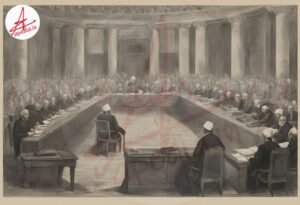January 26, 1950
- British parliamentary democracy
- American federalism
- Canadian provincial autonomy
- Irish proportional representation
Outlines fundamental values and goals of India.
Guarantees basic freedoms to citizens.
Guides the government in formulating policies.
Imposes obligations on citizens.
Government is responsible to the legislature.
Power is divided between central and state governments.
The highest court, ensuring the constitutionality of laws.
Pre-Independence
India was under British colonial rule with limited self-governance.
Constituent Assembly
Formed in 1946 to draft a constitution for independent India.
Adoption and Enforcement
The constitution was adopted on January 26, 1950, and came into force on the same day.
Amendments
The constitution has been amended numerous times to adapt to changing circumstances and needs.
Significant Amendments
- Basic Structure Doctrine: Establishes certain features of the constitution as unamendable.
- Emergency Provisions: Grant the central government extraordinary powers during emergencies.
- Uniform Civil Code: Aims to unify laws governing personal matters for all citizens.
- Reservation for Scheduled Castes and Scheduled Tribes: Provides representation in government and education.
Preamble
Sovereign, Socialist, Secular, Democratic Republic: Outlines the nature of the Indian state.
Justice, Liberty, Equality, Fraternity: Defines the fundamental values to be upheld.
Fundamental Rights
- Right to Equality: Prohibits discrimination based on caste, religion, sex, or place of birth.
- Right to Freedom: Guarantees freedom of speech, expression, assembly, association, movement, and religion.
- Right to Life and Liberty: Ensures the right to life, personal liberty, and bodily integrity.
- Cultural and Educational Rights: Protects cultural and educational rights of minorities.
- Right to Constitutional Remedies: Provides remedies for violations of fundamental rights.
Directive Principles of State Policy
- Social and Economic Justice: Guides the government in promoting social welfare and economic equality.
- Secularism: Ensures the religious neutrality of the state.
- International Peace and Security: Promotes cooperation with other nations.
Fundamental Duties
Civic Responsibilities: Imposes obligations on citizens to contribute to nation-building.
Parliamentary Democracy
- Rule of Law: Ensures that the government is subject to the law.
- Separation of Powers: Divides power among the executive, legislature, and judiciary.
Federal Structure
- Dual Governance: Power is shared between central and state governments.
- Cooperative Federalism: Encourages cooperation and coordination between the levels of government.
Judicial Review
- Supreme Court: The highest court, empowered to review the constitutionality of laws.
- Independent Judiciary: Ensures the impartiality of the judiciary.
- Implementation: Ensuring effective implementation of constitutional provisions.
- Interpretation: Resolving disputes over the interpretation of constitutional provisions.
- Balancing Rights and Duties: Striking a balance between individual rights and collective responsibilities.
- Adapting to Change: Addressing the challenges of a rapidly changing society.
The Indian Constitution is a living document that has evolved over time to reflect the aspirations and needs of its people. It provides a framework for governance, protects fundamental rights, and promotes social justice. While challenges remain, the Constitution continues to play a vital role in shaping India’s democracy and development.






